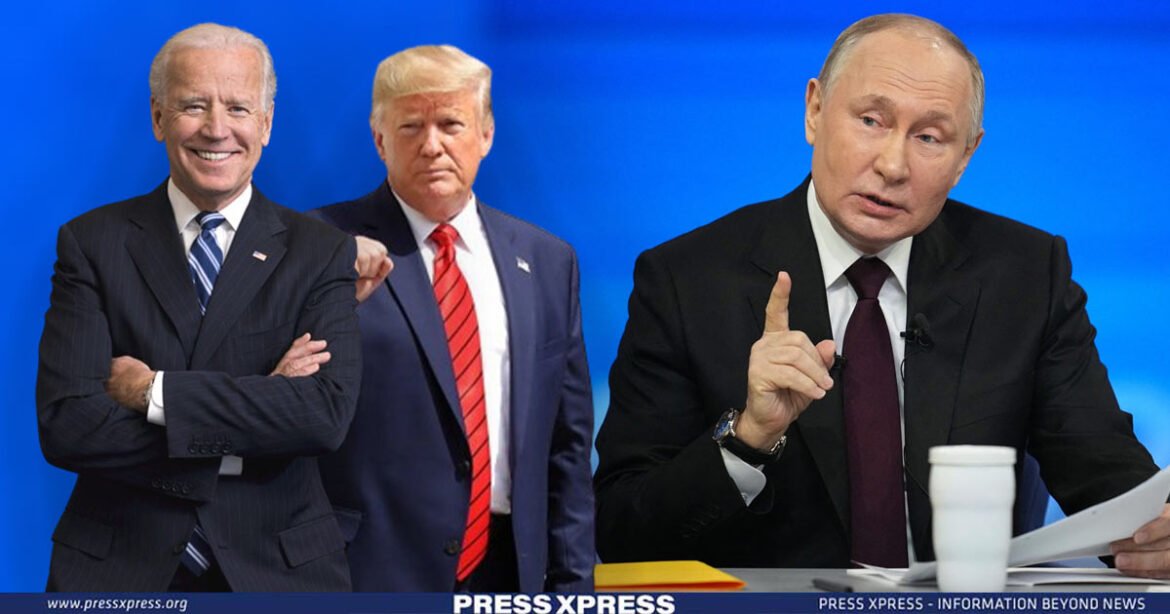″Biden is more experienced and more predictable. He is an ‘old school’ politician. But we will work with any US leader, elected by the people of America,” Russian President Vladimir Putin said.
Russian President Vladimir Putin’s recent comments on the 2024 US election race have sparked significant interest and debate. In an interview, Putin expressed a preference for Joe Biden over Donald Trump, citing Biden as a more experienced and predictable leader. This unexpected statement has raised eyebrows, especially given Biden’s strong stance against Russia’s 2022 invasion of Ukraine and the subsequent Western response. Putin’s willingness to openly discuss his preference and even touch on the sensitive issue of Biden’s mental fitness has added to the intrigue surrounding his remarks.

You Can Also Read: Trump Warns NATO about Russia, Claims Ignored Warnings
An Experienced and Predictable Choice
According to Putin, Joe Biden’s extensive experience and predictability make him a more favorable candidate from Russia’s standpoint. Describing Biden as an “old school” politician, Putin implies that his leadership style would offer stability and familiarity in diplomatic interactions between the two nations. Despite expressing this preference, Putin emphasizes Russia’s willingness to collaborate with any US leader elected by the American people, highlighting a pragmatic approach to international diplomacy.
Key Highlights
- In an interview, Putin expressed a preference for Joe Biden over Donald Trump
- Putin cited Biden’s experience and predictability as reasons for his preference
- Biden has taken a strong stance against Russia’s 2022 invasion of Ukraine
- Putin’s remarks followed international controversy over Trump’s recent NATO comments and tensions within the US
Trump’s Troubled Relationship with Russia
During his presidency, Donald Trump faced intense scrutiny over his relationship with Russia. Allegations of Russian interference in the 2016 election and suspicions regarding Trump’s ties to the Kremlin prompted extensive investigation and debate. Despite Trump’s repeated denials of collusion with Russia, questions surrounding the nature of his relationship with Putin persisted throughout his tenure in office.
In contrast to Trump’s perceived leniency towards Russia, President Joe Biden has adopted a more confrontational approach towards Moscow. Since assuming office, Biden has provided unwavering support to Ukraine, both militarily and financially, amidst escalating tensions with Russia. Putin has criticized Biden’s policies, describing the incumbent administration’s approach as harmful and erroneous.
Implications for US-Russia Relations
Putin’s endorsement of Biden over Trump underscores the intricacies of U.S.-Russia relations and the evolving dynamics between the two nations. While Putin may view Biden as a more predictable and manageable counterpart, fundamental differences in policy and approach persist. As the U.S. presidential election approaches and diplomatic tensions continue, the future trajectory of U.S.-Russia relations remains uncertain.

Previous Election Interference
In the 2020 US presidential election, a report by the US Senate Intelligence Committee found evidence of Russian attempts to influence the outcome in favor of Trump, who ultimately defeated Hillary Clinton. This history underscores the complexity of US-Russia relations and the potential impact of external factors on the electoral process.
Putin’s preference for Biden over Trump in the U.S. presidential election has sparked international attention and raised questions about the dynamics between the U.S. and Russia. The upcoming election and its potential impact on international relations will continue to be closely monitored.
Trump on NATO Issue
Putin’s remarks followed a week of international controversy over Trump’s recent NATO comments and mounting tensions between U.S. Democrats and Republicans over a $95 billion aid package that includes military aid to Ukraine.
The Future of Russia
With Putin, aged 71, potentially extending his rule until 2036, Russia braces for a third decade under his leadership. Given his widespread domestic popularity and support, this strategic move prompts inquiries into the country’s future political landscape, with expectations of minimal opposition for Putin in upcoming elections. As Russia observes these developments, the dynamics of Putin’s long-standing leadership and its ramifications for the nation’s future become increasingly prominent.
Conclusion
Putin’s public expression of preference for a US presidential candidate is a significant development that has captured global attention. His remarks at a time of strained US-Russia relations have added a new dimension to the already complex dynamics between the two countries. As the 2024 US election race unfolds, the implications of Putin’s comments are likely to be the subject of continued analysis and discussion


